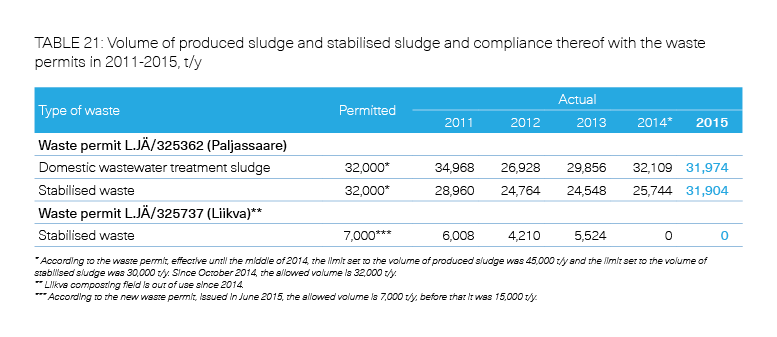Waste management
Waste generation
A total of 45,844 tons of waste was generated in the Company in 2015. The majority of waste is made up by the sludge, which is a by-product of the wastewater treatment process. Quite a substantial part of waste is also generated as a result of the construction and excavation works.
Although the sludge generated in the wastewater treatment process forms large part of our waste, we recycle all the sludge in our sludge treatment process. Sludge treatment process includes producing of soil for greenery from raw sludge and biogas from raw sludge fermentation, which then is used in the technological process and to heat the buildings. We make analyses from the soil for greenery four times a year, in line with the requirements set in the Decree No 78, issued by the Minister of Environment on 30.12.2002. All results of sludge analyses are publicly available on the Company’s webpage.
In addition to sludge, the wastewater treatment process produces significant amount of other types of waste, such as waste from screens, which is disposed to our waste handling partner. The volume of waste generated within the wastewater treatment process is directly affected by the volume of incoming wastewater, the weather and the efficiency of the City cleaning services. However, people also have an important role to play here as they can avoid throwing waste and hazardous substances into the wastewater system.
Excavated soil, stones and asphalt waste account for the majority of waste resulting from the networks maintenance and repair works. The volume of waste from construction and excavation works is again dependent on the volume of works. In 2015-2016 we have a very large Tihase collector reconstruction project ongoing, which resulted in the increase of construction waste such as metals and concrete. However, since 2013, we have been performing most of the network reconstruction works using the so-called no-dig method, which allows carrying the works out faster and reducing the inconveniences caused by traffic jams during the road works.
We collect and sort the other types of waste, which have a smaller share in the total waste volume, by their types to hand them over to the waste handling company. We separately collect paper and cardboard, biodegradable waste, hazardous waste, metal and mixed municipal waste.
Waste permits and sludge
The Company has two waste permits, issued to allow recycling the sludge produced in the wastewater treatment process to be recycled. The permits establish technical and environmental requirements for the waste handling process.
In 2015, a total of 31,974 tons of mixed sludge was produced within the wastewater treatment process and by the end of 2015, the estimated volume of mixed sludge in stock on the composting fields was 32,843 tons. In 2015, 38,285 tons of soil for greenery was given to people for free. Although a waste permit was issued also for Liikva composting field, since 2014, no sludge has been recycled in Liikva and the Liikva field is currently in reserve.


